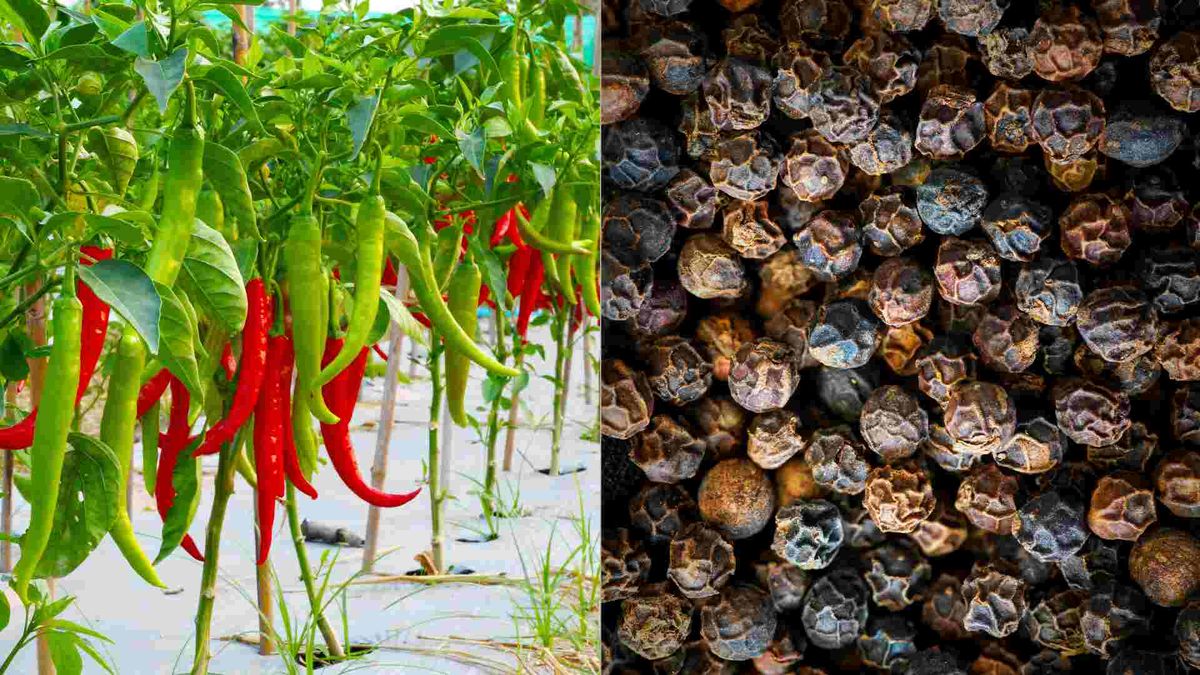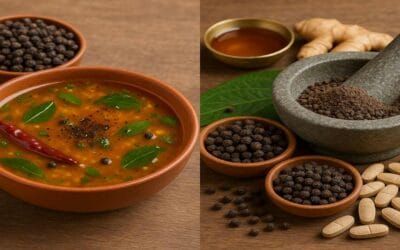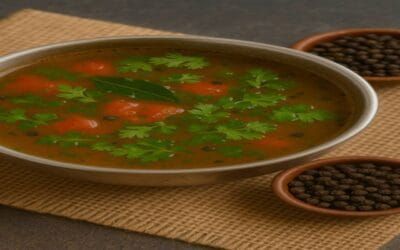Spices are ingredients that are not often discussed. They help make normal food extraordinary with their flavour. Among those spices, black pepper and chilli stand out as the best ones as they are most widely used by many people. Both spices add bold heat, but the flavours, their effects on the body, and other historical importance change and are completely different.
Black pepper affects the global trade. Its warmth and flavour make it an important ingredient in the kitchen all over the world. Chilli, on the other hand, rose from America and has spread all across the continents. It has become an important ingredient in many of the spiciest and most popular dishes. In this blog, we will discuss the differences between these two spices, comparing their uses, health benefits, ways of usage, and more.

Fundamental Contrast on the Heat and Flavour
Black pepper and chilli both add heat in a very different way; let’s see how they differ.
- Black Pepper: The heat in black pepper is added by a compound called piperine. This compound adds a sharp and warm taste that is left behind in the tongue, after having the food too. And it doesn’t overpower the taste of the dish. Even though the taste it adds is sharp, it uplifts the natural taste in the dish rather than covering it up with its own flavour.
- Chilli: Coming to chilli, the heat adds up from a compound called capsaicin, which enables the receptors to sense pain in the mouth. This gives a prickling to an intense burn, which defines the spicy cuisines. This is not like black pepper that adds twists, as chilli influences a dish with its burning kick.
How and Where to Use it?
1. Black Pepper:
This is used in various types of cuisines, like in European, asian and more. Some of the best uses of black pepper are,
- Meat Seasoning – This has become an important ingredient in modern cooking. This enhances the umami naturally in steaks, chicken and fish.
- Soups & Sauces – Adding black pepper in soups, sauces, broths and more will add warmth and depth to the recipe.
- Vegetable sides – Black pepper can be added when roasting vegetables, sautéing greens and also in mashed potatoes. This will give a fine taste.
- Sweet Dishes – Black pepper also goes well with fruits like strawberries, mangoes, watermelon, guava and more. This gives a layer of combination.
2. Chilli:
It doesn’t subtly enhance the flavour, instead, it takes the hero position in the dish. Some of the popular uses are,
- Curries – In India, it is most popularly used in a Goan dish called Vindaloo, where chilli gives its signature heat. And it contributes to most of the popular dishes, and I can name one or two, like Thai green curry, etc.
- Sauces & Salsas – Chilli is highly used in making hot sauces, salsas and other spicy stews, most popularly in the cuisines of Mexico.
- Fries & Noodles – The cuisines in southwestern China, mostly in Sichuan, use chili to create a numbing and burning sensation after eating their dishes.
- Pickles – In many cultures, chilli is used as an extra covering of heat to the dishes, especially in oils which are chilli-infused, pickles, pastas and much more. And these dumpings of chillies are common among most of the cultures.

Health Benefits: Black Pepper vs. Chilli
Both black pepper and chilli have a lot of health benefits that are used in the traditional medicines of India.
Black Pepper:
- Digestion – The active compound called piperine is present in black pepper, which helps in digestion and also helps in maintaining gut health.
- Immunity – This is commonly used in Ayurvedic medicines, as black pepper helps in curing cold, cough and other respiratory-related issues.
- Nutrients – Black pepper uplifts the absorption of nutrients. For instance, if you add some black pepper to haldi doodh, then it helps in absorbing the curcumin of the turmeric, which makes the benefits of turmeric milk more effective.
- Weight Loss – Black pepper supports the metabolism and helps in breaking down fat. This makes managing weight easy.
Chilli:
- Metabolism—The active compound found in chilli is capsaicin. This element helps speed up metabolism and promote weight loss.
- Congestion – Intaking spicy foods will help relieve congestion in the nasal passage. That’s the reason why chilli is used in making soups and curries in winter more often.
- Heart Health – Though chilli has side effects, it helps in clearing the bad cholesterol when consumed regularly. This helps in improving the function of the heart.
- Vitamins – Consuming chilli will give you vitamin C, which helps in uplifting your immune system.
Tips for Cooking & Storage
These are some of the tips that will help you in both cooking and storage.
Cooking with Black Pepper:
- Black pepper preparation matters since fresh crushing of black pepper produces better results than pre-ground pepper for your recipe.
- The best tasting results come from black pepper additions toward the end of cooking, since this preserves its essential oils for enhanced flavor in the food.
- The use of whole peppercorns in dal tadka, sambhar and even chai will produce a warm layer instead of using pre-measured ground peppers.

Cooking with Chili:
- Conduct seed removal from chillies to achieve less hotness in green pepper varieties for improved compatibility according to taste.
- You can dry roast entire red chillies to prepare them before usage. The dish will receive a richer taste from utilizing whole peppercorns after they have spent time in your cooking.
- Mixing chilli powder with ghee enables you to experience the chili flavor without getting the hot sensation. The combination of the ingredients will maintain flavor without producing excessive spiciness in the mix.
Storage Tips:
- To keep the Black pepper crisp and fresh, you should keep it away from moisture in an airtight container. And when needed, just take some peppercorns and grind them for that use alone. This will keep your pepper retaining its flavour and fresh for a long time.
- In addition to chillies, primarily, for dry red chillies, you can store them away from humidity in an airtight jar, and fresh green chillies can be kept wrapped in a paper towel and kept in the fridge for a long shelf life.
Right Spice for Right Dish
Basically, in Indian cooking, both chilli and black pepper balance the dish. As black pepper maintains a sense of warmth and depth, chilli shows its fiery face. However, both are essential for many of the traditional dishes. The right choice will depend on personal preference and the dish you are making.
In Indian kitchens, black pepper is popular in rasam and fiery spice, chilli is popular for many dishes, but I would point out Andhra curry. It all comes down to your preference for the sharpness of black pepper or the bold hit of chilli, as each gives its unique flavour to our daily meals.

Final Takeaway
Black pepper and chilli are both important in Indian dishes. Each spice offers a great flavour and health benefits. Choosing one between them is not about the superiority of the spice, but it is about the purpose in the dish. This can also be used interchangeably, as some of their qualities match. But the choice of using this depends on personal taste. And using both will create a balance between enhancing dishes and offering both comfort and a great taste to the dish. Both spices remain essential for cooking.
Read our Cardamom Articles:





You could certainly see your skills within the article you write.
The sector hopes for more passionate writers such as
you who aren’t afraid to mention how they believe. All the time follow your heart.